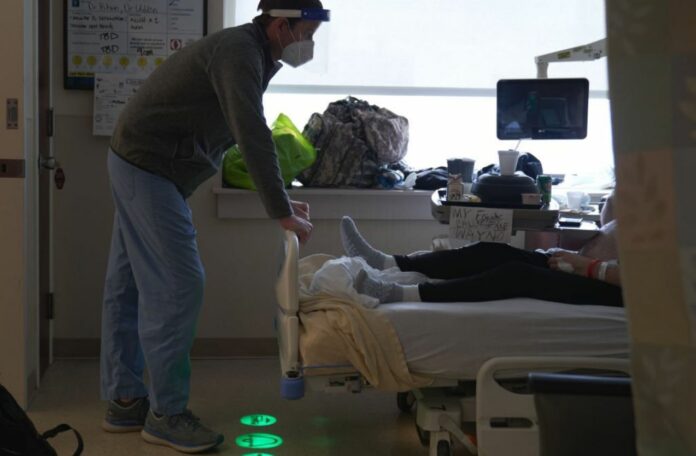If you’ve had severe COVID-19, this study reveals what your next six to nine months for your heart may look like.
New research presented at the EHRA 2023 scientific congress of the European Society of Cardiology (ESC) has found that patients who have had severe COVID-19 and required mechanical ventilation are at a significantly higher risk of developing ventricular tachycardia within six months, with their risk being 16 times higher compared to those who did not experience severe infection.
Additionally, the study found that there were elevated risks of other heart rhythm disorders in these patients.
These findings highlight the potential long-term cardiovascular consequences of severe COVID-19 and the importance of monitoring and managing the cardiac health of these patients in the aftermath of their infection.
“The actual likelihood of developing ventricular tachycardia or other arrhythmias after severe COVID-19 is low for the individual patient, but much higher than in those without severe infection,” remarks study author Dr. Marcus Stahlberg.
In an effort to understand the potential long-term impacts of severe COVID-19 on cardiac health, a study was conducted to investigate the risk of arrhythmias in patients who had been discharged from an intensive care unit (ICU) after requiring mechanical ventilation. The researchers utilized the Swedish ICU register to identify all COVID-19 patients who had undergone mechanical ventilation and were discharged alive from an ICU between March 2020 and June 2021. To compare their findings with the general population, each patient was matched with up to 10 people of similar age, sex, and district of residence. The researchers then analyzed compulsory national registries to monitor and record any new diagnoses of arrhythmias that occurred after the patients’ discharge from the ICU.
The study’s primary goal was to observe whether patients who had been discharged from the ICU after requiring mechanical ventilation for COVID-19 were at a higher risk of being hospitalized due to ventricular tachycardia, atrial fibrillation, other tachyarrhythmias, or bradycardia/pacemaker implantation. Ventricular tachycardia is a condition where the heart’s ventricle beats too fast, causing insufficient oxygenated blood supply to the body and posing a potential life-threatening risk. Atrial fibrillation, on the other hand, causes an irregular and rapid heartbeat, which can lead to breathlessness and an increased risk of stroke. “Other tachyarrhythmias” refers to an abnormally fast heartbeat not caused by atrial fibrillation. “Bradycardia or pacemaker implantation” is a combined outcome that refers to a slow heart rate or the need for a pacemaker due to a slow heart rate.
To investigate the increased risk of arrhythmias in patients with severe COVID-19, the researchers analyzed the likelihood of developing each type of arrhythmia in this patient group compared to those without severe COVID-19. To account for variables that could influence the risk of heart rhythm disorders, such as age, sex, high blood pressure, diabetes, high blood lipids, chronic kidney disease, and socioeconomic status (including education level, marital status, and income), the analyses were adjusted accordingly.
The study population comprised of 3,023 patients who had severe COVID-19 and required mechanical ventilation at a Swedish ICU, and a control group of 28,463 individuals from the general population who did not require mechanical ventilation during their treatment for COVID-19 or were not admitted to the ICU. The average age of the participants was 62 years, and approximately 30% were women.
“Higher age and male sex are two important risk factors for getting severely sick with COVID-19 and this was reflected in our study participants,” adds Dr. Stahlberg.
The study followed up with participants for an average of nine months. The incidence rates per 1,000 person-years of ventricular tachycardia, atrial fibrillation, other tachyarrhythmias, and bradycardia/pacemaker implantation in patients who had severe COVID-19 and required mechanical ventilation were 15.4, 78.4, 99.3, and 8.5, respectively. In contrast, the control group’s corresponding incidence rates were significantly lower, with 0.9, 6.0, 6.7, and 0.9 for the four types of arrhythmias, respectively.
Compared to the control group, patients who had severe COVID-19 and required mechanical ventilation had a substantially higher risk of developing arrhythmias. Specifically, these patients had a 16-fold risk of ventricular tachycardia, a 13-fold risk of atrial fibrillation, a 14-fold risk of other tachyarrhythmias, and a 9-fold risk of bradycardia/pacemaker implantation.
“COVID-19 patients who need mechanical ventilation often have other conditions and adding a heart rhythm disorder may lead to worsened health,” says Dr. Stahlberg, adding, “these patients should seek medical attention if they develop palpitations or irregular heartbeats after hospital discharge so they can be evaluated for possible arrhythmias.”
In conclusion, the lead researcher noted that previous studies have reported an increased risk of arrhythmias among the majority of COVID-19 patients who did not require ICU treatment.
Combining these findings with the results of their study, and considering the high number of reported COVID-19 cases worldwide (650 million as of 2023), the researcher suggests that hospitals should be prepared to manage an increase in patients with new-onset arrhythmias.
Image Credit: Allison Dinner/Bloomberg via Getty Images
